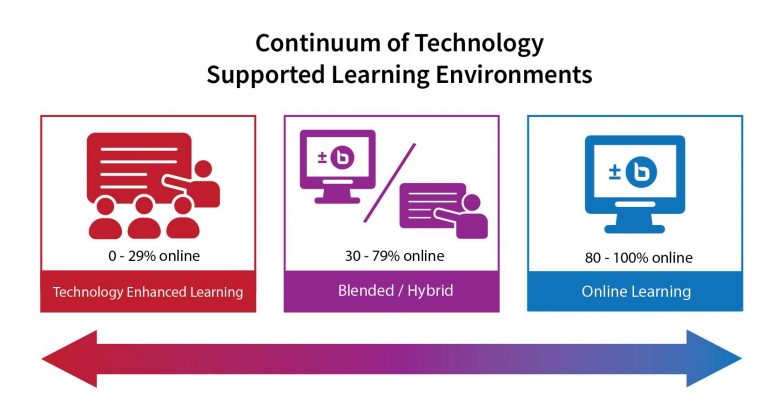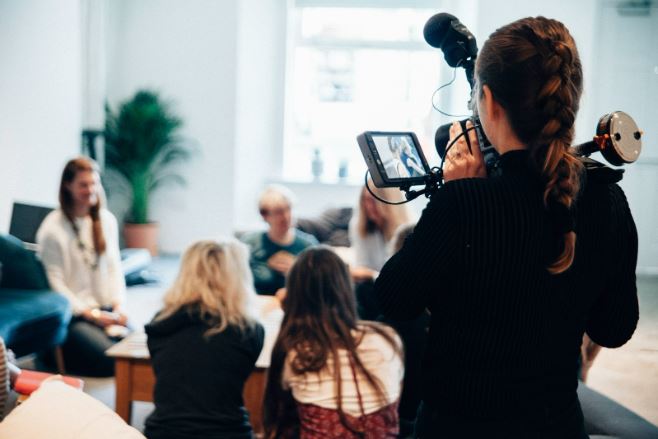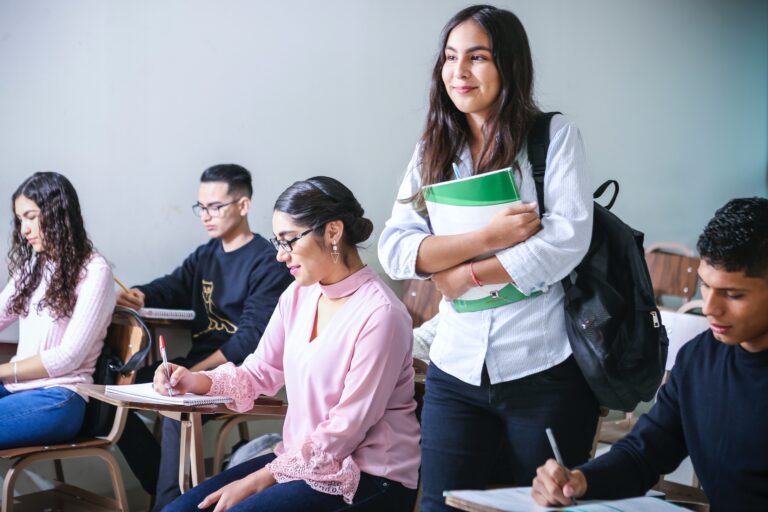Faculty Spotlight: Gerard Laverty
Written by: Anthony Nerada
When perusing the hallways of KPU’s Cloverdale campus, one needs only to stop and listen to hear the distant sound of horse hooves. For Gerard Laverty, an instructor in KPU’s long-standing Farrier program, that is music to his ears. “I don’t remember when I first came in contact with horses exactly, but if I were to guess, it would have been before I could even walk.”
Gerard grew up in Northern Ireland, forty miles west of Belfast, where his family ran a riding school in the late 1950s, long before it was common practice to do so. “My father trained racehorses,” he says with pride. “We did everything you could think of with a horse to make a living. We provided riding lessons, training, boarding, and even buying and selling.” Today, Gerard’s sister continues to run Moy Riding School, keeping the business in the family.
Because of his upbringing among the gentle giants, Gerard says it was only natural when he started considering a career in farriery. “Before I even finished high school, I decided I had had enough of sitting at a desk. The job of a farrier allows quite a bit of freedom. You’re a single operator owner, you get to be outside, and you decide how hard you want to work and how much you’ll charge.”
Gerard’s educational journey led him to Dublin where he spent three years fine-tuning his skills as an apprentice under a seasoned World War I veteran. “[The area where our shop was] is all gentrified now, but we were right in the heart of downtown.” Gerard recalls his days in that shop fondly, filled with all types of horses and, perhaps surprisingly, some familiar music. “There was a ragtag group of ne’er-do-wells right around the corner who had just formed a band. Back then, we thought they weren’t ever going to amount to anything, but, of course, they ended up being none other than [the band] U2,” he laughs.
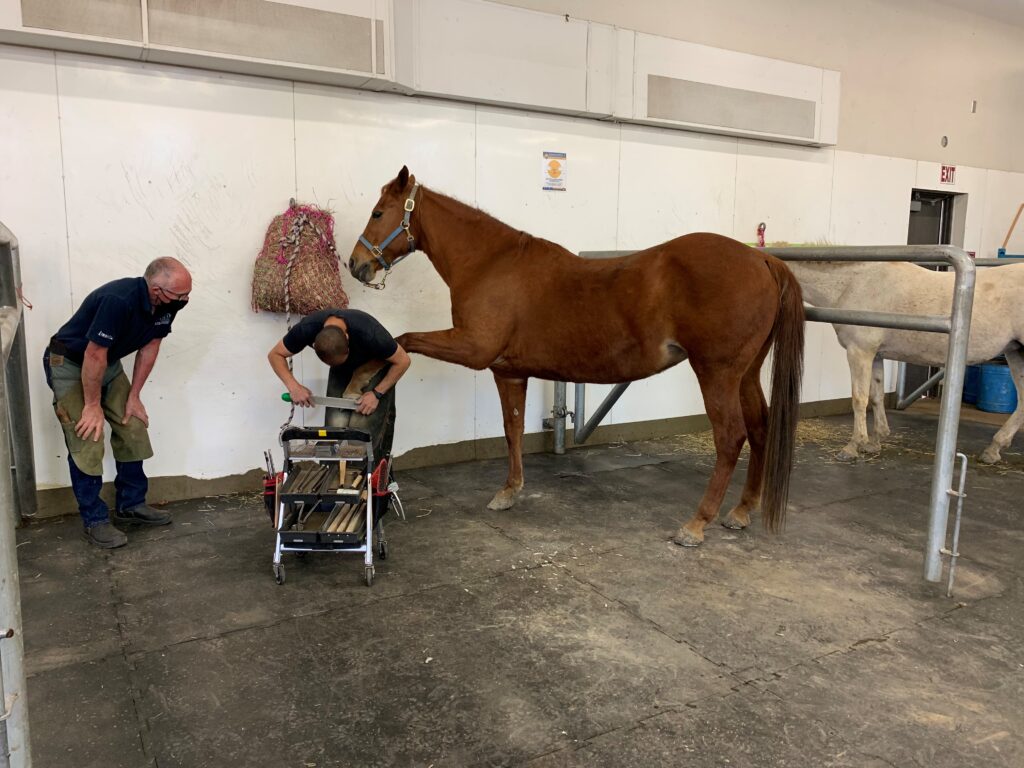
After running his own business for a year and a half, Gerard decided he wanted to see the world. “I jumped on a plane and flew to New York and never went home. I ended up spending two years in the US as a true journeyman.” The term journeyman is used to describe someone who has attained a certain level of skill in a particular field. Back then, whenever a journeyman would finish their apprenticeship, they would “pack up their bags and set off on a journey, travelling from shop to shop to finish their education.” Along the way, Gerard had the opportunity to work with over 25 people, all with their own method of doing things, which allowed him to round out his experience in a way he never would have been able to if he had stayed home. After travelling North and spending two decades in Prince George, B.C., Gerard made the move to the lower mainland where he secured a position as an instructor in the Farrier program at KPU in 2003. Today, as the first Canadian Associate Fellow of the Worshipful Company of Farriers – which was established in 1356 and boasts an exclusive membership of only 40 fellows the world over – Gerard is a force to be reckoned with.
When it comes to his teaching philosophy, Gerard believes in the power of resiliency in the face of failure. “We’ve all been sort of indoctrinated with this idea that we have to be successful right away. In the real world, we’re not going to succeed immediately at everything. That’s why the shop environment is more like a workspace rather than a learning space. We have horses that come in each day as if we were running a not-for-profit business and those horses present unknown opportunities because no know really knows what is going on with them until they come through the door. Even then, sometimes it’s not clear how things are going to go until we start interacting with them.”
In 2019, Gerard was devastated when it was announced that the Farrier program at KPU would be put on hold. Rather than sulk, Gerard saw an opportunity to reinvigorate the program from the ground up and quickly returned to the drawing board with the support of Brian Moukperian, Dean of Trades, and help from Dr. Kristie Dukewich (Faculty of Arts). “We essentially had to reshape the program so that it could meet the needs of the University while still providing the necessary training to our students.” The answer to Gerard’s problem, he soon found, laid in the power of technology:
We ended up creating a model that included PebblePad and ePortfolios as a vehicle to show the students’ progress. In the past, whenever my students created a shoe or some forged artifact they were particularly proud of, they’d post it on their Facebook page. But now, with PebblePad, they’re constantly recording what they’re doing and handing in weekly submissions of the reflections they’ve had over the week, which then becomes this ongoing account of their learning and experiences throughout the program.
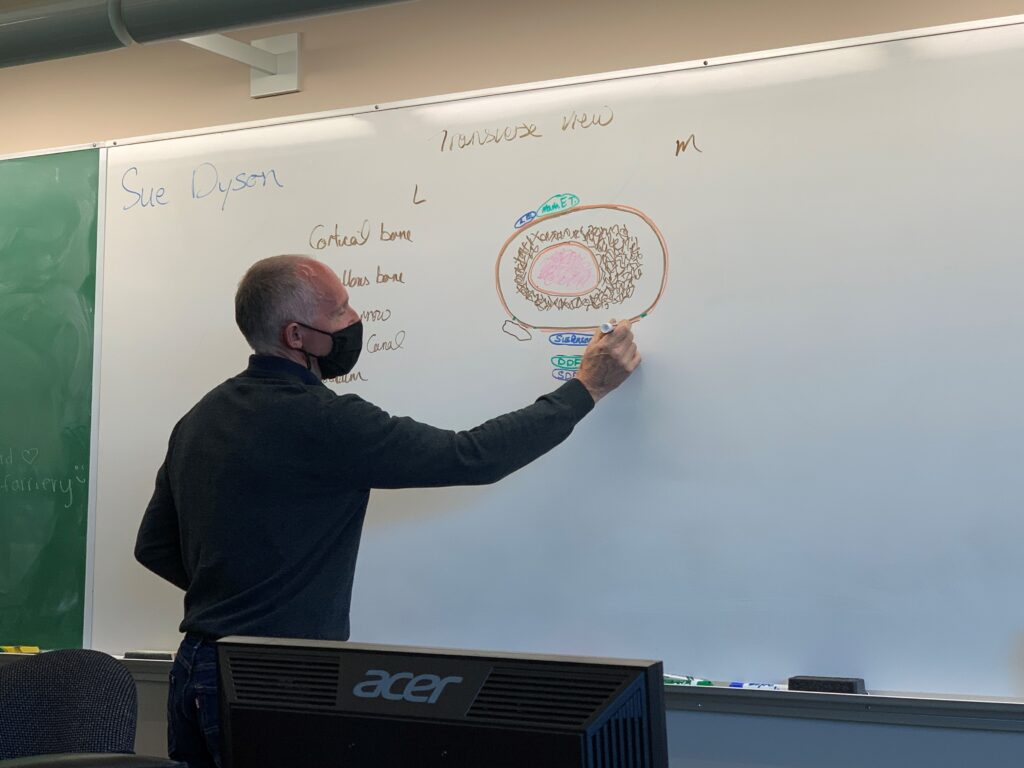
Since its relaunch last October, Gerard could not be happier. “[Incorporating PebblePad and ePortfolios into the program] meshed really well and I think it’s been a real success story. Here we have this really old trade that hasn’t changed much in the last 100 years and a community that engages mostly through social media. Having Farrier students create an ePortfolio was really no different than using Facebook. Once I realized that, I knew we were on to something.”
As a pioneer of PebblePad, Gerard chose to see the pivot to online learning last March as fortuitous timing. “It was an easy transition for me,” he says, citing that he went paperless “long before it was cool.” “The way our program is structured, the first month is compressed and concentrated heavily on theory using platforms like Microsoft Teams, Moodle, and BigBlueButton, before we move into the shop.” In this new COVID world, where wearing masks and social distancing is mandatory, Gerard believes the Farrier shop in Cloverdale is the perfect venue to abide by health and safety measures while still meeting the individual needs of the students.
When asked how he sees the Farrier program growing, Gerard points to the future with 3-D printers and robotics. “I can see a time where some kind of machine will do all the physical work, but there will always need to be a human there to assess what work needs to be done. Having a program like the Farrier program at KPU could create some great opportunities to explore some of those possibilities.”
While he is currently helping to develop a formal three-year Farrier apprenticeship, one that will be the first of its kind in the field, Gerard’s next endeavor is to adapt the program into a two-year diploma program to include computer applications, business and marketing courses, and arc welding – a more advanced way of forging horseshoes using an electric current – to complete the formal education one would need to start their own business. “It just makes a lot of sense. Over the years, I’ve had inquiries from as far away as Europe, India, and Korea. Turning the program into a diploma would also make it an attractive offering for international students because it would meet the requirement for length of study for someone outside the country.” While Gerard concedes that a Farrier Program may be an odd choice to have at a university, he whole-heartedly believes that the possibilities are endless. “[The program] really connects KPU back to its root as a polytechnic institution, just as the other trade programs on the Cloverdale campus do.” Given that the Farrier program also trains more women than all the other trades programs combined, the value of offering it is a no-brainer.
These days, Gerard spends his spare time dabbling in the thrills of Bitcoin and navigating the Vancouver coastline with a sailboat he bought at the height of the pandemic. “It’s a bit of a fixer-upper,” he admits. “I’m not a skilled carpenter in any way, but I tore the deck off last summer because I wanted to rebuild it. And I wasn’t that successful. I made a lot of mistakes. But I know a lot more now than I did before.” Motivated by a recent trip through the Gulf of Alaska, Gerard aspires to explore more of British Columbia through travelling up its coast in the near future. “If you go by sailboat, you bring your home with you!”
When communicating through email, Gerard signs off each correspondence with ‘Equo Servi – Serva Artem’, which roughly translates to ‘Serve the Horse – Preserve the Art’. Indeed, if ever there were a sentiment that better encapsulates the perseverance and resiliency that Gerard Laverty has shown in the last few years, it would be hard to come by.
If you would like to be featured in an upcoming newsletter or have a colleague, you wish to see featured please contact tlcommons@kpu.ca
Anthony assists in the daily marketing, communications, promotion, and event planning strategies of the Teaching & Learning department. In addition to managing our newsletter, Anthony also contributes to the coordination of our blog, Pedagogy + Practice, and helps develop and maintain the department's website and social media channels. Over the last few years, Anthony has worked for several critically acclaimed public relations firms in Vancouver, providing support on national campaigns for clients such as Scuderia Ferrari, Wonder Bread, Shell Canada, and the Vancouver Aquarium. Most recently, he enjoyed a one-year stint working at Walt Disney World Resort in Orlando, Florida. To complement his Bachelor of Arts in Psychology (KPU), Anthony has also earned a Public Relations diploma (KPU) and a Publishing diploma (Langara), which has given him the opportunity to fine-tune his skills in editing, website creation, and graphic design.
